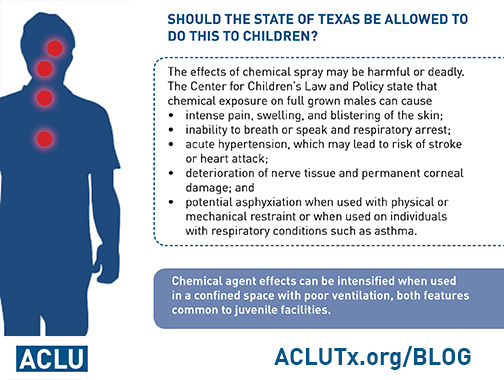The primary goal of Texas county juvenile justice facilities is to rehabilitate juveniles in order to develop good behavior and deter potential repeat criminal activity. However, new amendments proposed by the Texas Juvenile Justice Department (TJJD) on chemical spray in county juvenile facilities threaten the overall objective of juvenile justice and the safety of the youths and staff involved. The TJJD has proposed amendments to the Texas Administration Code Chapter 343, which would expand the chemical use of oleoresin capsicum (pepper spray) as an ordinary restraint method at county juvenile rehabilitation centers across the state. Not only does use of chemical spray negate the goal of rehabilitation, the use of this chemical restraint as punishment is outdated, ineffective, and harmful—not to mention, the proposed amendments lack proper definitions and guidelines to prevent the abuse of discretion in the facilities, opening the doors for medical claims against the state.
A report to the Council of Juvenile Correctional Administrators found that facilities with high numbers of restraint and chemical incidents are more likely to produce higher rates of safety problems because of youth and staff injury, suicidal behavior, and fear among the youths from injury by staff.
The reported higher rate of incidents explain why the Council of Juvenile Correctional Administrators’ annual, national survey revealed only six state juvenile corrections agencies authorizing the use of chemical spray in order to secure the facilities: The low national authorization is due to data that shows negative impacts on the staff, juveniles, and facilities when it is used. The survey also showed that 15 agencies authorized chemical restraints, but not necessarily for the staff to carry on their person. Nine of those 15 agencies only authorize chemical restraint as a last resort measure. Overall, nearly 90 percent of the total juvenile correctional agencies do not authorize staff to carry chemical spray as a means to secure facilities.
The American Bar Association (ABA) standards for Juvenile Justice allow
chemical restraint only in extreme situations and under strict controls . The ABA also requires the department to adopt regulations that closely govern such use. Not only would improper training and use of chemical restraint put the youth and staffs’ health at risk but would also result in the county and juvenile facility as subject to
numerous investigation and lawsuits .
Our Recommendations
At present, the proposed TJJD code allows for use when the juvenile exhibits “physical aggression.” That’s a term open to broad interpretation and without a more narrow definition, there is no limit to the use of the chemical spray.
To mitigate this risk, the TJJD needs to get more specific about uses and training. For one, the amendments should strictly prohibit use to situations where there is a certain risk of life or serious bodily injury. This language would help safeguard the use of chemical spray only as a last resort effort in cases of extreme crisis. The amendment does make room for a provision that requires staff to abstain from use of the chemical on juveniles with respiratory or eye conditions. Strangely enough, there’s no indication of how these individuals would even be identified. When staff members are instructed to react to any form of “physical aggression,” it’s unlikely they would stop to inquire about a youth’s eye or breathing conditions.
Also, the TJJD should better define who would be required to train the staff in proper use of the chemical spray. The current draft is mute on this matter, a vagary that could result in improper training and place the well-being of staff and youths in danger.
The TJJD should scrap these proposed amendments altogether. Various national written standards of chemical restraint reiterate the fact that pepper spray should not be used at all. However, if the TJJD insists on moving forward with authorization, it should adhere to strict rules regarding usage, reporting of usage, and post-use practices. To do so, the agency needs to draft amendments that are strictly and clearly defined. Presently, the TJJD falls well short of this mark and the consequences could be devastating.
Read our letter to TJJD on their proposed changes to pepper spray rules:
Update: After listening to concerns from the ACLU and our fellow advocates, TJJD has chosen to delay consideration of this new standard until January 2014.

